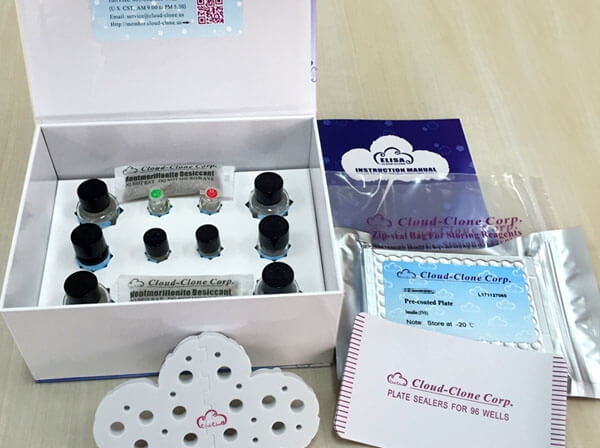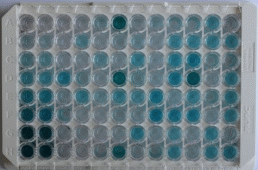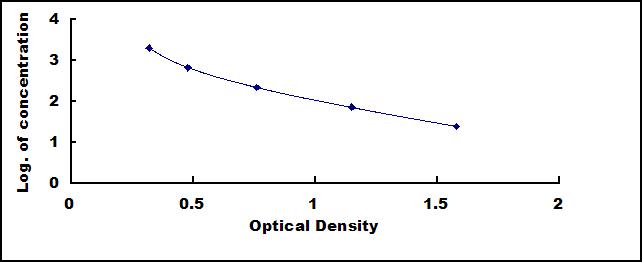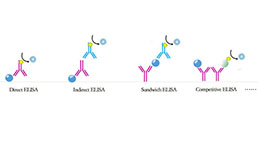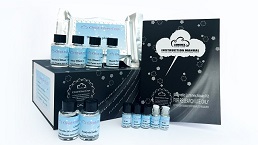ELISA Kit for Procalcitonin (PCT) 

Pro-Calcitonin
- UOM
- FOB US$ 479.00 US$ 684.00 US$ 3,078.00 US$ 5,814.00 US$ 47,880.00
- Quantity
Overview
Properties
- Product No.CEA689Rb
- Organism SpeciesOryctolagus cuniculus (Rabbit) Same name, Different species.
- ApplicationsEnzyme-linked immunosorbent assay for Antigen Detection.
Research use only - DownloadInstruction Manual
- CategoryInfection immunityHormone metabolism
Sign into your account
Share a new citation as an author
Upload your experimental result
Review

Contact us
Please fill in the blank.
Recovery
Matrices listed below were spiked with certain level of recombinant Procalcitonin (PCT) and the recovery rates were calculated by comparing the measured value to the expected amount of Procalcitonin (PCT) in samples.
| Matrix | Recovery range (%) | Average(%) |
| serum(n=5) | 95-104 | 99 |
| EDTA plasma(n=5) | 92-99 | 96 |
| heparin plasma(n=5) | 93-101 | 97 |
Precision
Intra-assay Precision (Precision within an assay): 3 samples with low, middle and high level Procalcitonin (PCT) were tested 20 times on one plate, respectively.
Inter-assay Precision (Precision between assays): 3 samples with low, middle and high level Procalcitonin (PCT) were tested on 3 different plates, 8 replicates in each plate.
CV(%) = SD/meanX100
Intra-Assay: CV<10%
Inter-Assay: CV<12%
Linearity
The linearity of the kit was assayed by testing samples spiked with appropriate concentration of Procalcitonin (PCT) and their serial dilutions. The results were demonstrated by the percentage of calculated concentration to the expected.
| Sample | 1:2 | 1:4 | 1:8 | 1:16 |
| serum(n=5) | 96-104% | 82-96% | 84-94% | 78-92% |
| EDTA plasma(n=5) | 79-90% | 83-97% | 80-94% | 95-102% |
| heparin plasma(n=5) | 82-96% | 80-96% | 78-104% | 89-98% |
Stability
The stability of kit is determined by the loss rate of activity. The loss rate of this kit is less than 5% within the expiration date under appropriate storage condition.
To minimize extra influence on the performance, operation procedures and lab conditions, especially room temperature, air humidity, incubator temperature should be strictly controlled. It is also strongly suggested that the whole assay is performed by the same operator from the beginning to the end.
Reagents and materials provided
| Reagents | Quantity | Reagents | Quantity |
| Pre-coated, ready to use 96-well strip plate | 1 | Plate sealer for 96 wells | 4 |
| Standard | 2 | Standard Diluent | 1×20mL |
| Detection Reagent A | 1×120µL | Assay Diluent A | 1×12mL |
| Detection Reagent B | 1×120µL | Assay Diluent B | 1×12mL |
| TMB Substrate | 1×9mL | Stop Solution | 1×6mL |
| Wash Buffer (30 × concentrate) | 1×20mL | Instruction manual | 1 |
Assay procedure summary
1. Prepare all reagents, samples and standards;
2. Add 50µL standard or sample to each well.
And then add 50µL prepared Detection Reagent A immediately.
Shake and mix. Incubate 1 hour at 37°C;
3. Aspirate and wash 3 times;
4. Add 100µL prepared Detection Reagent B. Incubate 30 minutes at 37°C;
5. Aspirate and wash 5 times;
6. Add 90µL Substrate Solution. Incubate 10-20 minutes at 37°C;
7. Add 50µL Stop Solution. Read at 450 nm immediately.

Test principle
This assay employs the competitive inhibition enzyme immunoassay technique. A monoclonal antibody specific to Procalcitonin (PCT) has been pre-coated onto a microplate. A competitive inhibition reaction is launched between biotin labeled Procalcitonin (PCT) and unlabeled Procalcitonin (PCT) (Standards or samples) with the pre-coated antibody specific to Procalcitonin (PCT). After incubation the unbound conjugate is washed off. Next, avidin conjugated to Horseradish Peroxidase (HRP) is added to each microplate well and incubated. The amount of bound HRP conjugate is reverse proportional to the concentration of Procalcitonin (PCT) in the sample. After addition of the substrate solution, the intensity of color developed is reverse proportional to the concentration of Procalcitonin (PCT) in the sample.
Giveaways
Increment services
Citations
- Evaluation of neutrophilic CD64, interleukin 10 and procalcitonin as diagnostic markers of early- and late-onset neonatal sepsisPubMed: 20085423
- Effects of Berberine Against Radiation-Induced Intestinal Injury in MicePubMed: 20637981
- Diagnostic and prognostic value of procalcitonin and phosphorus in acute mesenteric ischemiaPubMed: 21935794
- Serum procalcitonin and its relation to the outcome of ventilator-associated pneumoniain childrenEssbronchology: Source
- The Assessment of Vitamin D, Antimicrobial Peptides and Procalcitonin in BronchiectasisWaikato:Source
- Evaluation of the Diagnostic Utility of Fc Gamma Receptor Type 1 (nCD64) and Procalcitonin in Comparison with Conventional Methods for Diagnosis of Early Onset Neonatal SepsisEjmm:Source
- Efficacy of measuring procalcitonin levels in determination of prognosis and early diagnosis of bacterial resistance in sepsisPubmed:25657488
- The use and value of procalcitonin in solid organ transplantationPubMed: 25996831
- Diagnostic Value of Procalcitonin Levels in Acute Mesenteric IschemiaPubMed: 26185718
- Macrocalcitonin is a novel pitfall in the routine of serum calcitonin immunoassayPubMed: 26647152
- Procalcitonin and Pentraxin-3: Current biomarkers in inflammation in white coat hypertensionPubMed: 26040439
- Variation of Circulating Inflammatory Mediators in Staphylococcus aureus and Escherichia coli BloodstreamInfection.Pubmed:26772168
- Consistency and pathophysiological characterization of a rat polymicrobial sepsis model via the improved cecal ligation and puncture surgeryPubmed:26802602
- Early prediction of intestinal mucosal barrier function impairment by elevated serum procalcitonin in rats with severe acute pancreatitis.Pubmed:26804005
- Risk Factors of Acute Pancreatitis in Oral Double Balloon Enteroscopy.pubmed:27638962
- Changes in inflammatory mediators as a result of intermittent hypoxia in obstructive sleep apnea syndromepubmed:28960823
- INTERLEUKIN-1 RECEPTOR 2: A NEW BIOMARKER FOR SEPSIS DIAGNOSIS AND GRAM-NEGATIVE/GRAM-POSITIVE BACTERIAL DIFFERENTIATIONpubmed:27984536
- Hepatic Macrophages are the Cell Source of Hepatic Procalcitonin in Acute Liver FailurePubmed:29913443
- Inflammatory mediators in the diagnosis and treatment of acute pancreatitis: pentraxin-3, procalcitonin and myeloperoxidasePubmed:29593801
- Expression pattern of soluble triggering receptor expressed on myeloid cells-1 in mice with Acinetobacter baumannii colonization and infection in the lungPubmed:29707313
- Procalcitonin and C-reactive protein as peripheral inflammatory markers in antipsychotic drug-free schizophrenia patientsPubmed:29723719
- The predictive value of joint detection of serum amyloid protein A, PCT, and Hs-CRP in the diagnosis and efficacy of neonatal septicemia.Pubmed: 31298341
- Modestly Elevated Serum Procalcitonin Levels in Patients with Rheumatoid Arthritis Free of Active InfectionPubmed: 33080909
- Reevaluation of Lung Injury in TNF-Induced Shock: The Role of the Acid SphingomyelinasePubmed: 32410851
- Early label-free analysis of mitochondrial redox states by Raman spectroscopy predicts septic outcomes
- Moesin Is a Novel Biomarker of Endothelial Injury in Sepsis33628853
- Circulating nuclear factor-kappa B mediates cancer-associated inflammation in human breast and colon cancer33776564
- Original contribution: sleeve gastrectomy reduces soluble lectin-like oxidized low-density lipoprotein receptor-1 (sLOX-1) levels in patients with morbid obesityPubmed:35044516
- Procalcitonin is expressed in osteoblasts and limits bone resorption through inhibition of macrophage migration during intermittent PTH treatmentPubmed:35087025




